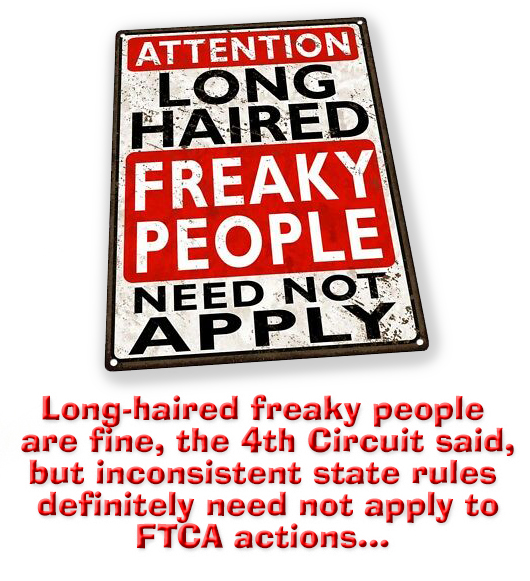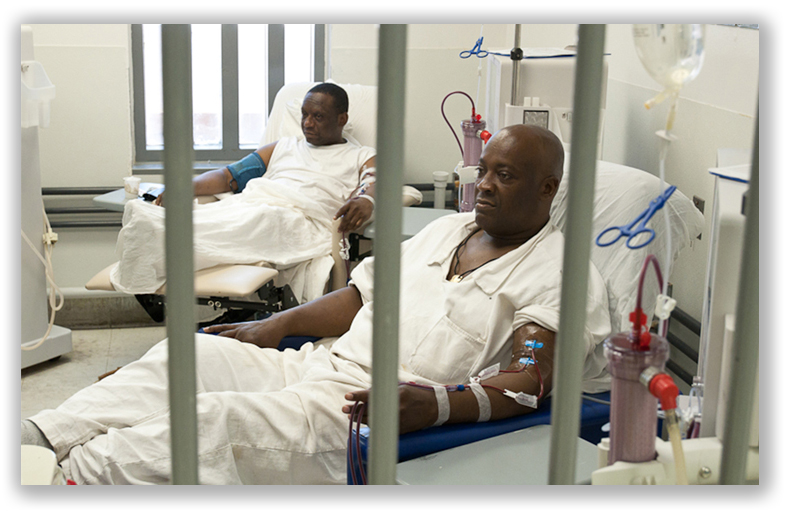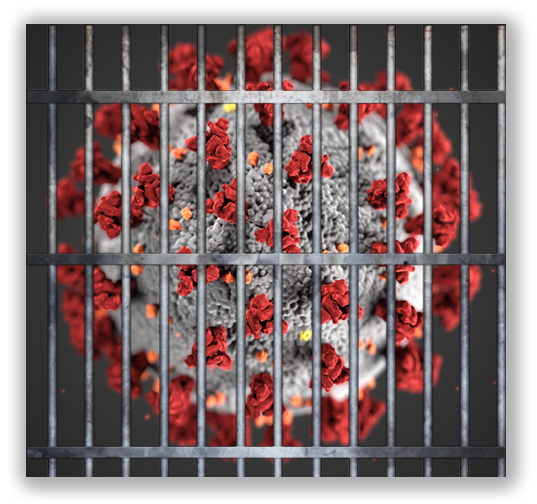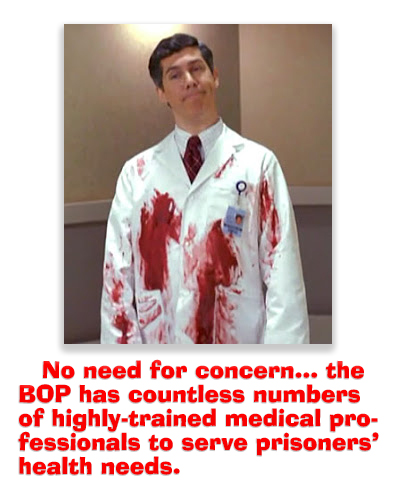We post news and comment on federal criminal justice issues, focused primarily on trial and post-conviction matters, legislative initiatives, and sentencing issues.

‘WE ARE STILL HUMAN’: CARSWELL MEDICAL CARE ON TRIAL IN SOUTH FLORIDA HEARING
 A woman whose 18-month federal sentence last April came with a promise by a BOP medical official that he’d personally see that she would receive the care she needed to treat her life-threatening seizure condition was back in court after only eight weeks in FMC Carswell, due to her attorney’s concern that “the BOP has proven unable to manage or prevent these life-threatening episodes.”
A woman whose 18-month federal sentence last April came with a promise by a BOP medical official that he’d personally see that she would receive the care she needed to treat her life-threatening seizure condition was back in court after only eight weeks in FMC Carswell, due to her attorney’s concern that “the BOP has proven unable to manage or prevent these life-threatening episodes.”
Suzanne Kaye suffers from severe, stress-induced seizures. She went into cardiac arrest on the floor of the courtroom last year when she was convicted of threatening to shoot FBI agents in the “f****** ass. When she was sentenced, her lawyer warned that sending her to prison could kill her.
At sentencing, the Court found that there was “no doubt” that Suzanne “does suffer from a serious health condition, in fact perhaps a number of health conditions,” that she was “medically frail,” and that “she will require much medical care.” But despite her undisputed seizure disorder and other medical ailments, the Court relied on testimony from the FMC Carswell Medical Director that the BOP could “provide Ms. Kaye with whatever medical care she needs.”
Suzanne self-surrendered in mid-July. Only two months later, her attorney told the court that Suzanne “has required emergency outside hospitalization on at least two separate occasions. Specifically, counsel has been advised that Mrs. Kaye has suffered ongoing, repeated seizures—including two major episodes—with the latest episode involving cardiac arrest. (It has also resulted in blood clots that are now not being monitored)…” The BOP’s “repeated failure is contrary to the picture painted by the government at sentencing. Counsel has also been advised fellow inmates have been forced to attempt to [provide] life-saving care during these seizures because prison officials failed to do so.”
 BOP medical official Mark Holbrook told the judge in April that some inmates have medical needs beyond what the Bureau of Prisons can treat. Suzanne, he said, was not one of them. But five months later, her heart and lungs briefly stopped working on the floor of a friend’s cell. Inmates screamed at the guards to call for help. “Granny’s eyes were wide open, but you could see that the light was no longer there,” wrote Katherine Moore, one of two incarcerated women who performed CPR on Kaye until medics arrived. “She was gone.”
BOP medical official Mark Holbrook told the judge in April that some inmates have medical needs beyond what the Bureau of Prisons can treat. Suzanne, he said, was not one of them. But five months later, her heart and lungs briefly stopped working on the floor of a friend’s cell. Inmates screamed at the guards to call for help. “Granny’s eyes were wide open, but you could see that the light was no longer there,” wrote Katherine Moore, one of two incarcerated women who performed CPR on Kaye until medics arrived. “She was gone.”
“That was my mistake,” Dr. Holbrook admitted to the judge last month.
The Palm Beach Post reported, “Letters from half a dozen inmates and the testimony of Carswell’s own medical director depict a standard of care unlike the one Holbrook promised. One where Kaye must depend on her fellow inmates to keep her heart beating, and doubts over the legitimacy of her seizures dampen what care she does receive.”
When vouching for Carswell, the doctor said Suzanne would have access to a neurologist to treat her seizures and a psychologist to treat the anxiety that triggers them. He also promised a combination of anti-seizure medications that would take the place of her medical marijuana. “He made several promises and several assurances. It appears none of which occurred,” Suzanne’s attorney told the judge last month. “I’m not saying he lied — maybe he meant to and he forgot — but it is inexcusable in my opinion.”
Dr. Holbrook told the judge he left a voicemail with someone he believed was Carswell’s clinical director and never heard back. Maitee Serrano-Mercado, Carswell’s clinical director, testified that she was never contacted by Holbrook, and prison staff only belatedly learned that Kaye had a history of seizures.
Still, Dr. Holbrook said he was thankful Suzanne was at Carswell because it is “the best location” for her to be provided care. “Second best” undoubtedly would be an abattoir.
 The Post noted that Carswell, once dubbed by the Fort Worth Weekly as a “hospital of horrors,” is “the only federal medical facility for incarcerated women in the country. It lost its accreditation during the pandemic and has not gotten it back. Indeed, the BOP seems to have no interest in doing so.
The Post noted that Carswell, once dubbed by the Fort Worth Weekly as a “hospital of horrors,” is “the only federal medical facility for incarcerated women in the country. It lost its accreditation during the pandemic and has not gotten it back. Indeed, the BOP seems to have no interest in doing so.
Carswell clinical director Serrano-Mercado argued at the hearing that Suzanne’s seizures might not be real. Serrano-Mercado admitted that the staff treating Suzanne are the same who treated a woman named Gwen Rider, a Carswell inmate who committed suicide in August. Like Suzanne, Rider was sent to Carswell because she needed medical treatment for epileptic seizures. Staff accused her of faking her seizures, too.
Suzanne was hospitalized again two weeks ago. Her mother, Brenda Kaye, told The Palm Beach Post that BOP medical personnel accidentally fractured her sternum while checking to see if she exhibited a pain response.
In an email to The Post, Suzanne called the treatment of herself and other women at the prison “nothing short of torture.” “People come in here walking and leave in wheelchairs. People die here,” she wrote. “I don’t want to be one of them.”
 After publishing this report in my newsletter last weekend, I received an email from a prisoner at Carswell. She had been present when Suzanne and two other prisoners suffered seizures:
After publishing this report in my newsletter last weekend, I received an email from a prisoner at Carswell. She had been present when Suzanne and two other prisoners suffered seizures:
I had run to get an officer for the first one (which was Suzanne) and she wouldn’t call it on the radio, a medical emergency so I had to run to inside [the Recreation area] and get the officers there. They came running, Once they made it over there another girl went down in a bad grand mal seizure, then another one went down, also a really bad one that seemed like it was never-ending. The rec officers did their best, then other officers showed up but medical never showed up. The officers on the scene had to put the ladies on the back of their easy-go car and drive them up to the hospital area one at a time.
The time they had broken Suzanne’s collar bone I believe [they were] trying to get her heart to beat again. Just thought I would share an experience I had firsthand to put more information out there! Medical here does not care about us. They are desensitized and should all for the most part be replaced. We are still human and do not deserve to be treated like this.
Palm Beach Post, ‘Inexcusable’: Attorney blasts federal prison officials over Boca woman’s medical care (October 27, 2023)
Motion for Hearing (ECF 200), United States v. Kaye, Case No 9:21-cr-80039 (SD Fla., September 12, 2023)
– Thomas L. Root















